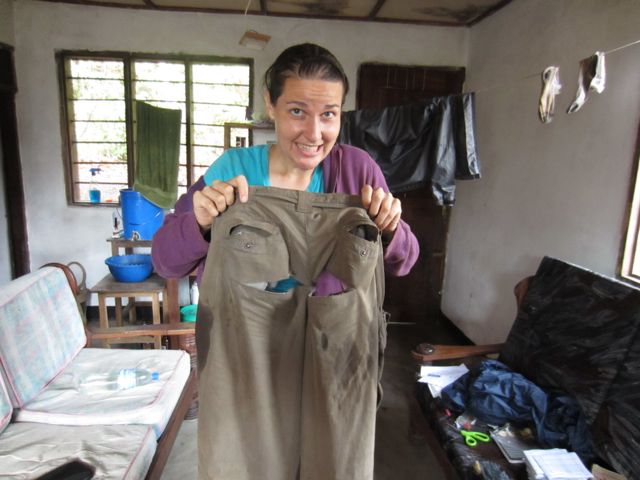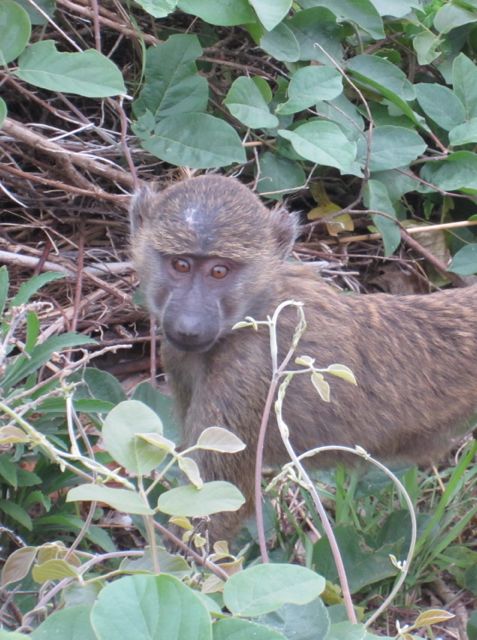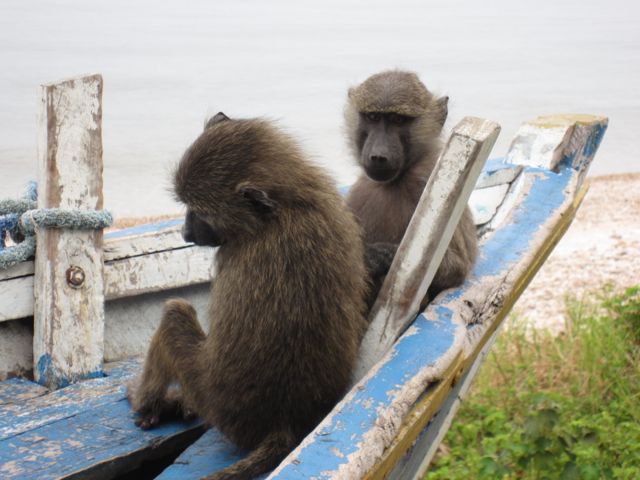Life in DC
I’ve mentioned DC before. They are the large group of urban baboons that hang out in camp, pilfering and fighting and generally causing a ruckus. Well, recently I have started following this group and, let me tell you, theirs are a far sight from the innocent shenanigans of BA and AC. See, life in DC is the hard-knock life. It’s dirt and grit and here’s-a-punch-in-the-teeth-so-say-thank-you. The kids are wilder, the adults meaner. The whole ethos of the group is rough and tumble, living-by-your-wits, all violence and conniving. Everyone sleeps with one eye open.
The first clue that DC was a far cry from the Kansases of my other groups was the kids. There are countless little ones rolling around with head wounds or clumps of hair missing. They’ve grown up on the mean streets where someone is just as likely to give you a hard smack as a gentle groom, and they have the scars to prove it. They make me think of young gang members,
eyes swollen black from another fight, and all this getting knocked about turns them into bravado and swagger. In my other groups, little kids are curious about us, but they are also timid. In DC, you can beeline right up to some tyke and he’ll just look at you as if to say, “What? You expect me to move? Tough.” As they get bigger this pissing in the face of authority turns into outright boldness. Three year old boys taunt me as I walk past them, flashing their eyebrows at me in the typical “you want a piece of this?” baboon move. A couple particularly tough ones openly harass me. I don’t know all the juveniles’ names because they’re not vital for my current research, but some I’ve come to recognize and name because I run into them frequently. Ofisi (Swahili for “office”…I call him this because he often saunters into the office as if it’s no big thing and then doesn’t leave, even if you threaten him) will often amble up to me and snatch my pants. I always tell him to knock it off and he just looks at me like I’m some kind of nasty insect and refuses to back down. He probably weighs 10 pounds. Tops. His insolence is only eclipsed by Potter (he’s missing a big chunk of hair which made me want to call him Harry, but we’ve already got a Harrison, so…). Potter goes out of his way to walk up and slap my legs. He usually follows up a smack with a couple firm pushes. Other days he’ll just take a running start and actually Jackie-Chan ricochet of my shin, like I’m a tree trunk and he’s a parkour master. It’s ridiculous. Then, as these kids get older still, they turn into thugs on a street corner, loitering in groups and ogling me as I walk by. I can practically hear the whistles and jeers and tend to clutch my computer tighter and avoid eye contact as I hustle by.
The adults are also brazen. The one-eyed female I’ve already written about has broken into our house twice and barely responds to threats, even if you pelt her with rocks (she also has the delightful and perplexing name of “Salad”). When I’m
home alone in the middle of the day I’ll hear the startling rattle of someone trying to burst through the door and my heart will climb into my throat until I remember that the door is locked. And I’m never worried because I think it’s people. It’s never people. Our windows are covered in thick wire grates like we live in a bad part of New York City and it’s only because an enterprising baboon can rip through something thinner in a matter of minutes. As it is we’ve already discovered a security breach on one of the windows, the grate peeled back by nimble fingers, and we’re desperate for a repair because only a little bug mesh lies between us and a house full of smashed bananas and monkey poop. Beyond thievery, the adults are also more likely to threaten, with males making overt displays of their massive canines (and the scars to back up their use) and the females giving me a good eye-browing or, in the case of Honey yesterday, a firm slap on the leg (Honey, it turns out, is not really a honey). I find myself constantly chastising these baboons, aloud, exasperated, like some worn out teacher in one of those teenage inner-city hooligan movies and, just like that teacher, I find my pleas falling on deaf ears. I want to move back to the country.
Kids on a Boat
What I Know About Swahili
Swahili is a funny language. Sometimes there’s a word to say exactly what you mean when it would take three in English. For example, the word pole (pronounced “POL-eh) is used to express empathy to someone for something that happened that is not great. Your mother-in-law just died? Pole. You stubbed your toe? Pole. You had a long day at work? Pole. Your psycho ex-girlfriend just slashed your tires and kidnapped your cat? Pole. The closest English equivalent I can think of is a combination of “sorry” and the commiserative “that sucks”. However, sometimes we have one word (and several equivalents) in English and Swahili is bewilderingly lacking. Like, there is no word for “earlier”, as in “I saw him earlier” or “you should have told me earlier that you were on fire”. To express sentiments for which there is no word (or for which I don’t know the word), then, things get rather clunky, ie. “I saw him before this time right now.”
I’ve been particularly intrigued by Swahili animal names as of late. In English we can say monkey and, to the layman, that covers all manner of primate, from those wandering the ground to those swinging through the trees. In Swahili, each of the “monkeys” here has a name and there is no general term to encompass them all. Baboons are nyani. Chimps are sokwe. Colobus monkeys are vyondi, red-tailed monkeys kima (though this might actually be the word in Kiha, the local language in this region). Yet, though they went crazy with monkey monikers, other animal names are strangely non-specific. Zebras are “striped donkeys”. Otters are “water hyenas” (a personal favorite of mine).
And as a learner of Swahili, I am finally starting to pick up on some of these idiosyncrasies and employ them. It now feels normal to say things like “they are here here” and “you are causing me to like you”. And the things I don’t know how to say, I just make up. Hamimu, my intrepid young assistant, has gotten very used to me explaining things using my somewhat limited vocabulary. To explain the possibility of my having a parasite I told him the other day, “Maybe there is an insect inside me.” (I also just add an “i” to the end of English words if I don’t know the Swahili word…kind of like Spanish and adding an “o”). And, perhaps most importantly of all, I’ve garnered enough grammar, vocabulary, and hutzpah to tell someone off in Swahili. I can now chastise children and wayward employees and even, in an awkward incident the other week, tourists. A baboon I was following saw two tourists sitting at one of the outdoor tables, eating their breakfast. Doing so breaks one of the cardinal rules of the park, mainly because baboons are not shy about relieving you of said breakfast. As my target made a beeline for them, a large male in tow, I started yelling at them in Swahili, “You can’t eat outside! The baboons will rob you and bite you! Take the food! Go!” Of course, these two tourists were American and therefore totally bewildered by the wild-haired woman dashing toward them and gibbering unintelligibly, but the baboons eventually made my point for me, and the guys got rid of their food. Later I clarified my ramblings in English and realized that perhaps I’ve been here a bit too long if the first language I choose to tirade in is Swahili.





